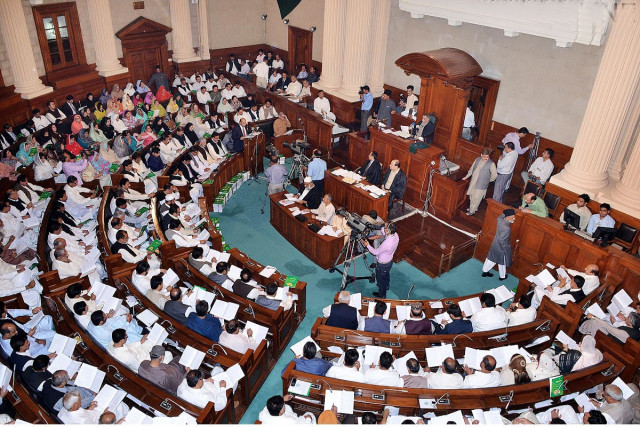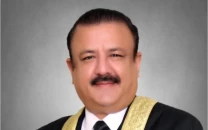Can PA speaker declare governor’s order unconstitutional?
Senior law officer says Sibtain is defying Constitution by going ahead with move

A debate has triggered whether or not Punjab Assembly Speaker Muhammad Sibtain Khan could declare the governor’s order to Chief Minister Parvez Elahi, a PML-Q stalwart, to take a vote of confidence as unconstitutional.
A senior law officer told The Express Tribune that he believed it was defiance of the Constitution by the PA speaker to declare the governor’s requisition as unconstitutional.
He added that if the ruling would be challenged in the superior courts, its fate would be similar to that of then-National Assembly deputy speaker Qasim Suri -- declared unconstitutional by the apex court.
The lawyer, however, said the PA speaker should take up the issue which came in his secretariat first – the opposition’s resolution for holding a vote of no-confidence against the chief minister.
Senior lawyers have urged the opposition in the Punjab Assembly to challenge its speaker's ruling in the superior courts.
Although matters could be taken up before the Lahore High Court, but former PA deputy speaker Dost Mazari’s ruling was challenged in the Supreme Court, which declared it unconstitutional.
A senior PTI lawyer has expressed his surprise as to how the PA speaker could declare the governor's order as unconstitutional.
He pointed out that the last para of the ruling gave a good opportunity to the opposition to challenge it in a court.
One section within the PTI doubts that it was a deliberate move by a provincial minister, who has a soft corner for CM Elahi, and they want to delay the dissolution of the assembly against the wishes of party chairman Imran Khan.
PTI Senator Ali Zafar, who is a legal expert, said according to the Constitution, there was a timeframe to complete the process for holding a vote of no-confidence against the chief minister.
On the other hand, there was no timeframe in the Constitution to hold a vote of confidence for the CM as per the governor's directives, he noted.
“My opinion is that the PA speaker should take up the vote of no-confidence resolution submitted by the opposition in the provincial assembly first,” Zafar added.
He, however, did not comment on the last para of the ruling wherein the governor’s order was declared unconstitutional.
Another senior lawyer said the dissolution of the Punjab Assembly could be averted through political means rather than legal ones.
Senior lawyer Hafiz Ahsaan Ahmad Khokhar said in the present case, the governor and the opposition members of the Punjab Assembly had simultaneously invoked Article 130(7) and 136 of the Constitution against the chief minister.
He added that as per Article 107 of the Constitution, a provincial assembly shall, unless sooner dissolved, continue for a term of five years from the day of its first meeting.
In addition to that, it shall stand dissolved at the expiration of its term.
“Under Article 112 (1) of the Constitution, the governor is bound and has no legal choice except to dissolve the provincial assembly if so advised by the chief
minister,” he observed.
“The provincial assembly shall, unless sooner dissolved, stand dissolved at the expiration of 48 hours after the chief minister has so advised,” Khokhar explained.
The senior lawyer said the chief minister shall hold office during the pleasure of the governor under Article 130(7) of the Constitution.
However, he added that the governor shall not exercise his powers under this clause unless he was satisfied that the chief minister did not command the confidence of the majority of the members of the provincial assembly.
“In that case, he [governor] shall summon the provincial assembly and require the chief minister to obtain a vote of confidence from the legislature,” he added.
Khokhar said though there was no time limit imposed under Article 130(7) of the Constitution upon the chief minister to acquire a vote of confidence, but the governor was competent and could fix a date of reasonable time for this purpose.
“On the receipt of these directions, the PA speaker cannot adjourn the matter on his own will. The matter referred to by the governor under Article 130(7) of the Constitution should be implemented within a very reasonable time,” he elaborated.
He further stated that a resolution for a vote of no-confidence moved by not less than 20% of the total membership of the provincial assembly could be passed under Article 136 (1) of the Constitution against the chief minister.
He added that the resolution referred to in clause (1) of Article 136 of the Constitution and shall not be voted upon before the expiration of three days, or later than seven days, from the day on which it was moved in the provincial assembly.
“If the resolution referred to in clause (l)of 136 of the Constitution is passed by a majority of the total membership of the provincial assembly, the chief minister shall cease to hold office. However, the governor under Article 133 of the Constitution can ask the chief minister to continue holding the office until his successor took over,” the senior lawyer explained.
According to Khokhar, the present matter in view of the situation prevalent since April, and the ruling of speaker on any point, would ultimately go to a superior court both in terms of the process of vote of confidence as required by governor under Article 130(7) of the Constitution with respect to holding a session as fixed by him, and the point of process for the vote of no-confidence as submitted by opposition under Article 13(6) of the Constitution.
PML-N lawyers believed that in case the chief minister did not take a vote of confidence as the per the governor’s directions on Wednesday (today), then Elahi would no longer be the CM.
They added that the governor could pass any order in the prevailing political situation.


















COMMENTS
Comments are moderated and generally will be posted if they are on-topic and not abusive.
For more information, please see our Comments FAQ